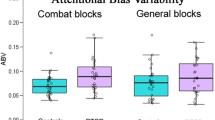Abstract
Vietnam combat veterans either with or without posttraumatic stress disorder (PTSD) participated in a computerized Stroop color-naming experiment in which they named the colors of neutral, positive, negative, and combat words. Idiographic stimulus selection established the personal emotional significance of the stimuli. Words appeared either randomly or blocked by type. Results indicated that PTSD patients exhibited more interference for combat words than for other words, whereas control subjects exhibited similar, but less pronounced, patterns of interference. Positive words produced no more interference than neutral words, and much less than combat words. This paradigm may provide a nonintrospective index of intrusive cognition in traumatized people.
Similar content being viewed by others
References
American Psychiatric Association. (1987).Diagnostic and statistical manual of mental disorders (3rd ed., rev.). Washington, DC: Author.
Beck, A. T., & Steer, R. A. (1987).Beck Depression Inventory manual. San Antonio: The Psychological Corporation.
Cassiday, K. L., McNally, R. J., & Zeitlin, S. B. (1992). Cognitive processing of trauma cues in rape victims with posttraumatic stress disorder.Cognitive Therapy and Research, 16, 283–295.
Foa, E. B., Feske, U., Murdock, T. B., Kozak, M. J., & McCarthy, P. R. (1991). Processing of threat-related information in rape victims.Journal of Abnormal Psychology, 100, 156–162.
Francis, W. N., & Kučera, H. (1982).Frequency analysis of English usage. Boston: Houghton Mifflin.
Gotlib, I. H., & McCann, C. D. (1984). Construct accessibility and depression: An examination of cognitive and affective factors.Journal of Personality and Social Psychology, 47, 427–439.
Klein, G. S. (1964). Semantic power measured through the interference of words with color-naming.American Journal of Psychology, 77, 576–588.
Kulka, R. A., Schlenger, W. E., Fairbank, J. A., Hough, R. L., Jordan, B. K., Marmar, C. R., & Weiss, D. S. (1990).Trauma and the Vietnam generation: Report of findings from the National Vietnam Veterans Readjustment Study. New York: Brunner/Mazel.
MacLeod, C., & Rutherford, E. M. (1992). Anxiety and the selective processing of emotional information: Mediating roles of awareness, trait and state variables, and personal relevance of stimulus materials.Behaviour Research and Therapy, 30, 479–491.
Martin, M., Williams, R., & Clark, D. M. (1991). Does anxiety lead to selective processing of threat-related information?Behaviour Research and Therapy, 29, 147–160.
Mathews, A., & MacLeod, C. (1985). Selective processing of threat cues in anxiety states.Behaviour Research and Therapy, 23, 563–569.
McClelland, G. H., & Judd, C. M. (1993). Statistical difficulties of detecting interactions and moderator effects.Psychological Bulletin, 114, 376–390.
McNally, R. J., Amir, N., Louro, C. E., Lukach, B. M., Riemann, B. C., & Calamari, J. E. (1994). Cognitive processing of idiographic emotional information in panic disorder.Behaviour Research and Therapy, 32, 119–122.
McNally, R. J., English, G. E., & Lipke, H. J. (1993). Assessment of intrusive cognition in PTSD: Use of the modified Stroop paradigm.Journal of Traumatic Stress, 6, 33–41.
McNally, R. J., Kaspi, S. P., Riemann, B. C., & Zeitlin, S. B. (1990). Selective processing of threat cues in posttraumatic stress disorder.Journal of Abnormal Psychology, 99, 398–402.
McNally, R. J., Litz, B. T., Prassas, A., Shin, L. M., & Weathers, F. W. (1994). Emotional priming of autobiographical memory in post-traumatic stress disorder.Cognition and Emotion, 8, 351–367.
McNally, R. J., Luedke, D. L., Besyner, J. K., Peterson, R. A., Bohm, K., & Lips, O. J. (1987). Sensitivity to stress-relevant stimuli in posttraumatic stress disorder.Journal of Anxiety Disorders, 1, 105–116.
McNally, R. J., & Shin, L. M. (in press). Association of intelligence with severity of posttraumatic stress disorder symptoms in Vietnam combat veterans.American Journal of Psychiatry.
Spielberger, C. D., Gorsuch, R. L., Lushene, R., Vagg, P. R., & Jacobs, G. A. (1983).Manual for the State-Trait Anxiety Inventory. Palo Alto: Consulting Psychologists Press.
Spitzer, R. L., Williams, J. B. W., Gibbon, M., & First, M. (1990).Structured Clinical Interview for DSM-III-R. Washington, DC: American Psychiatric Press.
Thrasher, S. M., Dalgleish, T., & Yule, W. (1994). Information processing in posttraumatic stress disorder.Behaviour Research and Therapy, 32, 247–254.
Vrana, S. R., Roodman, A., & Beckham, J. C. (in press). Selective processing of trauma-relevant words in posttraumatic stress disorder.Journal of Anxiety Disorders.
Williams, J. M. G., & Broadbent, K. (1986). Distraction by emotional stimuli: Use of a Stroop task with suicide attempters.British Journal of Clinical Psychology, 25, 101–110.
Author information
Authors and Affiliations
Additional information
Preparation of this article was supported, in part, by a grant from the Henry and Ramsey Pevsner Fund in Neuropsychology and Behavioral Medicine awarded to Susan P. Kaspi, and by National Institute of Mental Health grant MH43809 awarded to Richard J. McNally. We thank Howard J. Lipke, Roger C. Metz, Robert J. O'Brien, and Austin Staunton for their invaluable assistance in subject recruitment. Finally, we appreciate the superb comments made by an anonymous reviewer.
This experiment was conducted when the authors were at the Department of Psychology, University of Health Sciences/The Chicago Medical School.
Rights and permissions
About this article
Cite this article
Kaspi, S.P., McNally, R.J. & Amir, N. Cognitive processing of emotional information in posttraumatic stress disorder. Cogn Ther Res 19, 433–444 (1995). https://doi.org/10.1007/BF02230410
Issue Date:
DOI: https://doi.org/10.1007/BF02230410




